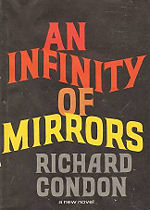An Infinity of Mirrors
An Infinity of Mirrors, first published by Random House in 1964, was the fifth novel by Richard Condon.
Critical reception
Time magazine was not greatly impressed by Condon's latest offering and gave it a fairly cursory review:
Richard Condon's apocalyptic pocketa-pocketa has produced a resplendent collection of giants, ogres and drowsy princesses, all flimsily disguised as people. They reappear in this grim foray into Hitler-corrupted Germany, but the author of The Manchurian Candidate has turned from dismayed humor to dismaying homily. Condon's current princess is an enormously wealthy, unbelievably beautiful Frenchwoman; though Jewish, she is married to a monocle-twirling Prussian general who cannot see the evil of Hitler until their adored child dies in a Jewish concentration camp. They retaliate by consigning the guilty SS officer to a grisly fate. However, the novel does not keep its implicit promise to find meaning in mankind's acquiescence in evil. Worse, Condon's stylistic limitations, which hardly matter in a farce, cripple a serious novel. As an old Hollywood press agent and the possessor of a considerable comic talent, he should recall the studio adage that messages are for Western Union.[1]
Flaws were also found in the book by the New York Times but its much longer review was generally more favorable:
Any novelist who conspires with history in writing a novel runs the obvious risk of letting history do too much of the work. Something like this has happened to Richard Condon in "An Infinity of Mirrors." A note on the dust jacket tells us that the author spent three years researching writing this book, and a bibliographical preface confirms the thoroughness with which this research has been done.
In a way, such conscientiousness is too bad; one suspects that this might have been a better novel if it weren't such good history -- if Mr. Condon, that is, had been more willing to play with his characters as fiction creations....
Because Mr. Condon possesses a diverting style (he is best known for his ring-a-ding "The Manchurian Candidate"), these keys offer admission to a kind of Playboy Club in which all the entertainment is in the Grand Guignol manner. Hitler is discovered to be the owner of the club, brooding and seldom seen, in an inner office. General Keitel is maitre d'hotel. Generals von Stauffenberg and Stuelpnagel are head waiters and SS officers act as bouncers. The club is bankrupt, the bunnies are mostly hors de combat, if we may be permitted a fractured-French pun), and, as Mr. Condon states in his title, there are lots and lots of mirrors.[2]
Title
The title, as is the case in five of Condon's first six books, is derived from a fictitious Keener's Manual mentioned in many of his earlier novels: "God surrounded me with an infinity of mirrors which repeat my image again and again and again."
The sentence is found in as an epigraph on a blank page six pages after the title page and three pages before the beginning of the text.
Theme
Characters
Typical Condon quirks and characteristics
As befits a mostly serious examination of two decades of brutality and tragedy, the "madness of his similies, the lunacy of his metaphors"[3] for which Condon was already noted are, in this case, along with many of his other characteristics, such as long, madcap, details lists of trivia, almost entirely muted.
References
- ↑ "Also Current: Sep. 4, 1964", Time magazine at [1]
- ↑ NYT Sept. 13, 1964, "Too Real to Live" by David Dempsey
- ↑ As George Axelrod put it in reviewing one of Condon's works in the International Herald Tribune; Axelrod was the author of the well-known plays The Seven-Year Itch and Will Success Spoil Rock Hunter and had collaborated with Condon on the screenplay for the first film adaptation of The Manchurian Candidate,

